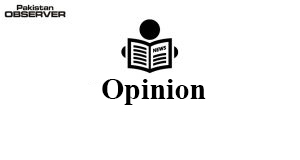Articles and letters may be edited for the purposes of clarity and space. They are published in good faith with a view to enlightening all the stakeholders. However, the contents of these writings may not necessarily match the views of the newspaper.
EVM bill
Whatever happened in the joint session of Parliament on Thursday was a setback for democracy.
The EVM bill had become a matter of prestige for the government while voting rights for overseas Pakistanis were considered crucial to win the next election.
The government was twice defeated in the National Assembly in voting on some bills and a joint session of Parliament was called off at the last moment. The way the PTI got a number of bills passed has naturally aroused questions.
All the more so when days before the session numerous PTI allies went public over the miseries of the people and the allies’ inability to sell government policies to their voters. What led to a sudden change of heart in them raises questions.
The way the bills were passed brought no credit to the government. The Speaker acted as an unabashed party loyalist.
His rulings invariably favoured the government. His decision on the voice vote was almost automatic, supporting the government irrespective of which side had the loudest voice.
This led to noisy protests, jeering and a chaotic situation.
This speaks volumes about the lack of democratic culture in the country’s parliamentary process.
When the Chair ignored the opposition which had serious reservations against the bills, the opposition leaders staged a walkout to register their protest.
Despite recourse to all unfair tactics the government failed to come up with 222 members required for the passage of bills in a joint session.
The Opposition also blamed that Treasury votes were over-counted. The PTI government’s contempt for state institutions has led to bypassing Parliament by increasingly relying on presidential ordinances to make changes in the laws.
The electronic voting system could aggravate differences with the ECP. The devious ways used to carry the day would serve those who hope to control the country by manipulating the flaws in the system.
PDM chief rightly said that undemocratic forces are being strengthened. This practice is dangerous for stability and integrity of the country.
JAMSHED ALAM SIDDIQUI
Lahore
COP26 and Pakistan
Climate conversations (Conferences of the Parties) at the international level have been taking place from as far back as 1995 with limited success.
At COP21 at Paris in 1995 for the first time ever something momentous happened: every participating country agreed to work together to limit global warming to well below two degrees and to aim for 1.5 degrees in order to save lives and livelihoods.
The Paris Agreement set out that every five years countries must set out increasingly ambitious climate actions and update their long-term plans for reducing carbon emissions.
COP26 was held at the SEC Centre in Glasgow, Scotland from 31st October to 13th November this year.
Ex-US President Trump opted out of the climate change talks but President Biden’s Administration has rejoined COP26 with John Kerry as its representative.
Big carbon emitters like India have extended their timelines for the net zero target beyond 2050 while Australia refuses to cut down on the use of coal.
In this context former UN Secretary General Ban Ki Moon is of the view that awareness of the consequences of climate change should be increased among children in schools. Pakistan is among the ten countries most affected by global warming.
In this context PM Imran Khan’s Billion Trees Tsunami is a large-scale effort to avert deforestation in the country.
At the current pace of global warming coastal cities like Karachi and Gwadar, and low-lying countries like Bangladesh, could get flooded as early as 2050. In a survey of 93 cities globally in terms of air quality, Lahore is among the more polluted cities.
Brick kilns and petrol and diesel vehicles are among the main culprits. Electric vehicles and alternative kiln technologies are safer substitutes.
SAAD MAQBOOL BHATTY
Islamabad
Law & order in Lahore
The law-and-order situation is quite unsatisfactory in Lahore. Everybody is worried about the lawlessness.
Mobile snatching, car lifting, robbery, theft and other illegal activities are increasing. People do not feel safe anywhere.
The law and order situation is worsening in the city. If the present situation persists, it is going to be the most dangerous city in the world as it has emerged as the most pollutant city in the world. Nobody feels safe here especially outside the home.
Everybody is worried about the increasing lawlessness in the city. Moreover, everyone is feeling fear while going outside.
As we all know that Lahore is considered as the oldest city of Pakistan and many tourists and foreigners come here to explore this city and know about its history.
The police are not doing their duty to check all these illegal activities. The concerned authorities should look into the matter and try to improve the law and order situation:
M ZAIN UL ABIDEEN
Via email










